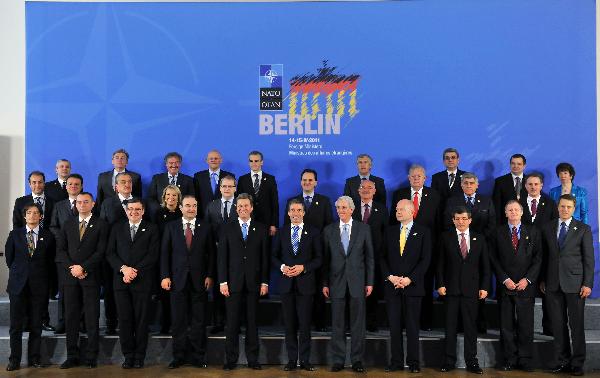NATO set to promote Libyan mission
 |
|
Participants of the NATO Foreign Minister meeting pose for the official portrait during the second day of NATO Foreign Ministers meeting in Berlin, Germany, April 15, 2011. [Xinhua/Ma Ning] |
In press conferences during the meeting, NATO Secretary General Anders Fogh Rasmussen continually restated that the NATO is strictly implementing the UN Security Council Resolution 1973 " both in letter and in spirit", and taking the responsibility of protecting civilians in Libya from attacks with "all necessary measures", just as the resolution asked for.
He stressed that the NATO has no intention of interfering with Libyan people's political process, and the future of the violence- torn North African country will be in hands of its own people.
However, the alliance set a clear condition on this no interfering -- the departure of current Libyan leader Muammar Gaddafi. "NATO is absolutely determined to continue its operation for as long as there is a threat against Libyan civilians and it is impossible to imagine that threat disappear with Gaddafi in power," Rasmussen said in the closing press conference.
On Thursday, his words looked less straightforward: NATO " endorsed" the outcome of the first meeting of the Contact Group, which called for Gaddafi to leave power.
However, the position was greatly strengthened by an article published Friday in The International Herald Tribune and other two mainstream newspapers. The authors represented three prominent members of NATO -- U.S. President Barack Obama, British Prime Minister David Cameron and French President Nicolas Sarkozy.
"So long as Gaddafi is in power, NATO must maintain their operations so that civilians remain protected and the pressure on the regime builds," they vowed, adding that their countries " have been united from the start" in responding to the Libyan crisis.
In a joint statement, NATO foreign ministers made clear three objectives of its military operation in Libya: the end to all attacks and threat of attacks against civilians, the withdrawal of all Gaddafi's forces to bases, and an immediate humanitarian access.
Goals are clarified within the alliance, but the Berlin talks still failed to offer a clear answer to how to achieve them, as rifts remained among the powers with different considerations of interests.
Only six out of NATO's 28 members are conducting air strikes in Libya as the United States has moved back to a supporting role late March. Many countries, such as Italy, have put restrictions on the use of their planes.
 0
0 







Go to Forum >>0 Comments